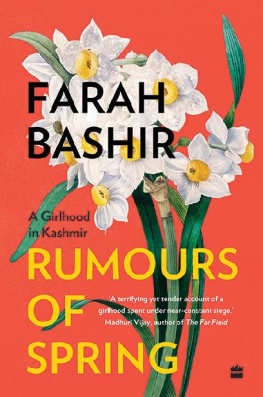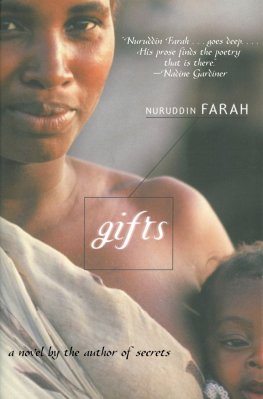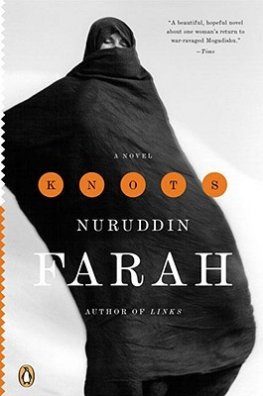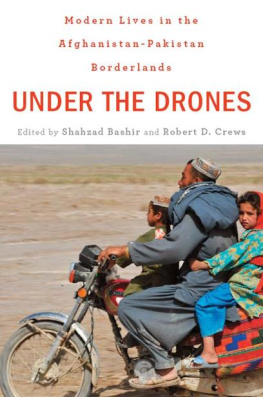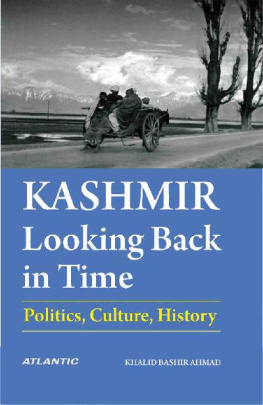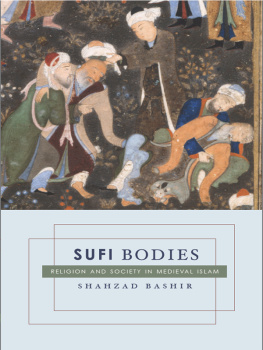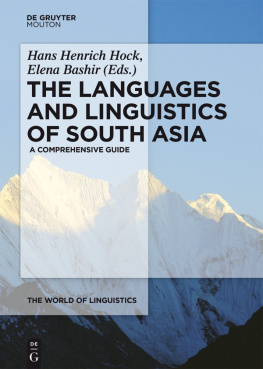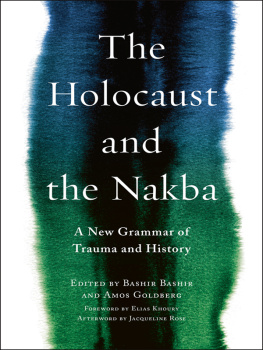IT WAS A CHILLY DECEMBER evening in 1994, which had the stillness of snow without any snow.
I had turned eighteen that year, and for the first time in my life, I felt grateful for the dusk-to-dawn curfew. My grandmother, Bobeh, had died late that afternoon. It was because of the curfew that I could spend an extra night with her around. On an ordinary night, curfew swelled up the air with fear and uncertainty. It controlled everything. It disciplined people inside their own houses, animals on the streets, and had even tamed the loud sneezes of the tobacco-seller who lived two houses from ours. That night, however, the curfew felt like a blessing.
I didnt get to say a proper goodbye to my grandmother, my Bobeh. Had I known on the night of 18 December that it would be our last one together, Id have been more polite to her. The next day, she was already gone by the time I reached home after taking my exams.
The previous night, I had decided to stay up late to study. Bobeh stayed up with me as long as the dim light of the kerosene lamp lasted. Shed had an asthmatic attack recently, and that made her look visibly distressed. But it was her unwavering gaze on me that made me irritable.
I am studying! Do you think Ill revise insincerely if you look away? I told her, raising both my chemistry book and my voice.
She didnt respond, but continued to watch me, wheezing occasionally. She had had several asthmatic attacks before, but they had become more frequent since the time the firing of tear gas had become the norm. It used to be so harsh on her. Later I wondered if, on that night, it was also the torment of death that had shown on her face.
In the morning, after I had left to take the exam, a few adjoining neighbourhoods between home and school were cordoned off by the troops so that they could conduct search operations, commonly known as crackdown. On such days, our roll number slips doubled as our identity passes and we were let through. By the time we finished writing our exam, at around two oclock, the search had been extended to more areas. By the time I reached home, it was around five.
Chemistry was the first paper on the schedule. I had done reasonably well and the feeling of relief that followed gave me a ravenous appetite. As always, I had been too nervous that morning to eat anything and had sat through my exam on an empty stomach. I was looking forward to a hearty meal, but the detour I had to take emaciated me further. Famished, I reached home to find a commotion of people outside our koche. My heart sank.
Was someone hit by a bullet?
Who could it be?
Was Father injured at the shop?
Was Mother hit by a grenade shell or a shrapnel?
As these thoughts came to my mind, my throat tightened, as if I was being strangled. I could barely breathe. I inched towards our house with wobbly knees. The main wooden door was open. A couple of shopkeepers from the neighbourhood were coming out of the house as I floated in bewildered. Sajida, our elderly next door neighbour, and the keeper of most secrets in the neighbourhood, was descending the stairs as I slowly climbed up. Go, have one last look at your grandmother. As Sajida uttered those words, for a brief second, all I could see around me was a blackness. The turquoise shawl she had wrapped around her head disappeared. The darkness was followed by a sharp pain in my belly. I got my period which lasted less than a day.
In the corridor, I heard Fathers voice say: How am I to take the responsibility of so many curfew passes? What if they shoot someone?
They were trying to decide if they should bury Bobeh that very night or on the following day. Father seemed adamant about everyones safety. He declared that the burial was to be postponed by a night.
Father, Mother, Ramzan Kaak and Pophtaeth, an aunt of mine who had come to pay Bobeh a visit, stayed up all night in the living room as some of the neighbours left. They spent the long hours praying for her. I didnt pray. I felt numb, and then restless.
That night, too, the room was dimly lit. Mother had arranged blankets under which everyone could sit through the night. Ramzan Kaak readied kerosene lamps and lined them by the door. Everyone had a booklet of Quran that they were reciting verses from. Had the body of Bobeh not been lying in the corner where shed usually sit, it could pass off as the Night of Atonement or Shab-e-Baraat, when all of us stayed up the whole night to pray. The room was humming, but a strange silence befell the corner Bobeh was lying in. The heavy soundlessness of that corner was more overwhelming than the unease the silence of the dawn-to-dusk curfew brought on. I sat in another corner of the room, staring at Bobehs still hands and her long, delicate fingers.
There was a night when Bobeh looked close to how she looked after passing. Pale, silent and stiffened. It was on the eve of Eid in 1989, the Eid that set a precedence for future ones to come. That Eid eve, as a twelve-year-old girl, I decided unwittingly to never participate in festivities again. In fact, from then on, I began associating inexplicable melancholy with Eid, and the heaviness that settled on the heart that day sank deeper each year.
Before 1989, my anticipation of the festivities on the eve of Eid usually surpassed the excitement I felt during the festival itself. There was an eagerness to wear new clothes, along with matching shoes and fashionable accessories. The rich, spicy aromas that wafted from every kitchen in the neighbourhood, suffused not just the individual courtyards but the entire mesh of interconnected narrow streets. The menu at our house was carefully selected. Mother would cook some of the dishes herself while the rest were ordered from Ashraf waze, the renowned chef of our area. Father would sit quietly in a corner of the living room, away from his usual spot. With his back towards the door, hed stealthily count the crisp currency notes that hed distribute among his sisters and their children as Eidi the next day . The whole evening would be punctuated with the sound of the main door being opened and shut by my sister Hina, whod invariably have to go out for her last-minute visits to the tailor and the salon.
In comparison, the day of Eid was rather muted. It began with wearing fineries, sitting in front of the Dastarkhwaan, drinking kahwe, breaking bread together as a family. The rest of the day was spent waiting for the relatives to visit our house with my share of Eidi.
When I was around eight or nine years old, Father would pack me in the back of his car an ochre Range Rover , JKD 7575 on Eid as hed drive along with Ramzan Kaak. Ramzan Kaak was Fathers assistant at his clothing shop in Boher Kadal. He was roughly Fathers age, physically stronger, and the most trusted man of our household. I remember seeing the mass prayer congregation that year at Eid Gah where hundreds of men, clad in crisp Khan dress and skull caps, had gathered to pray with their children, who were dressed up in bright colours. Rows of vendors selling wooden horse carts, rattlers, red strips of crackers and colourful plastic toys surrounded the large field where the men prayed. I didnt know then that the same prayer-ground would come to be known as the martyrs graveyard.


